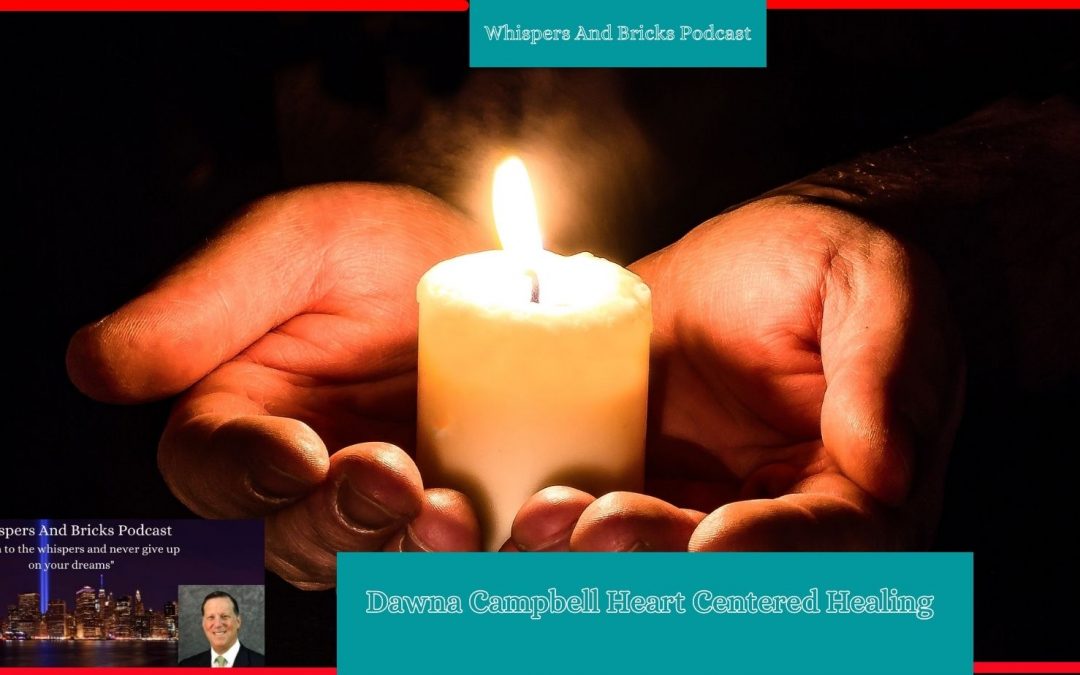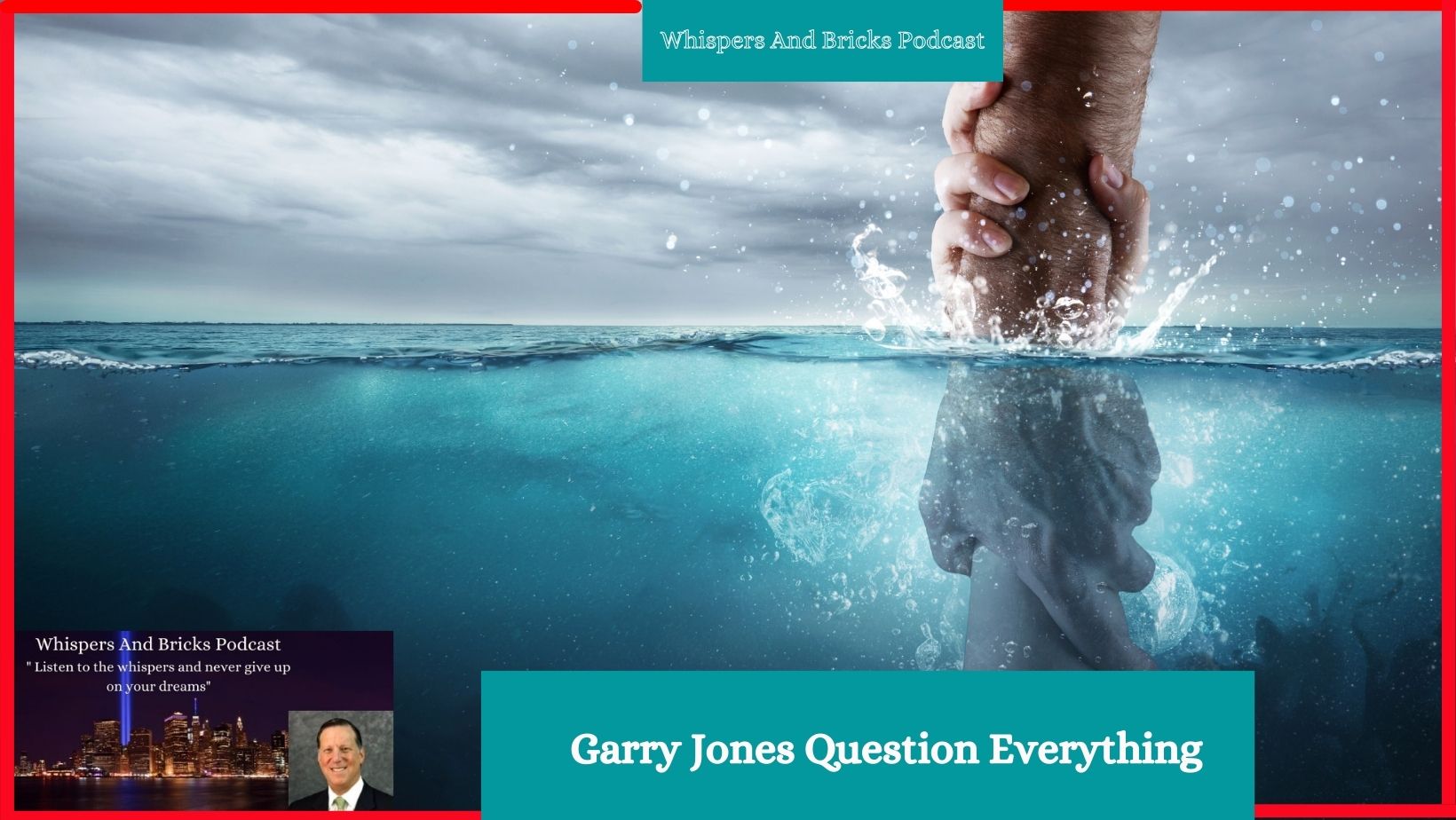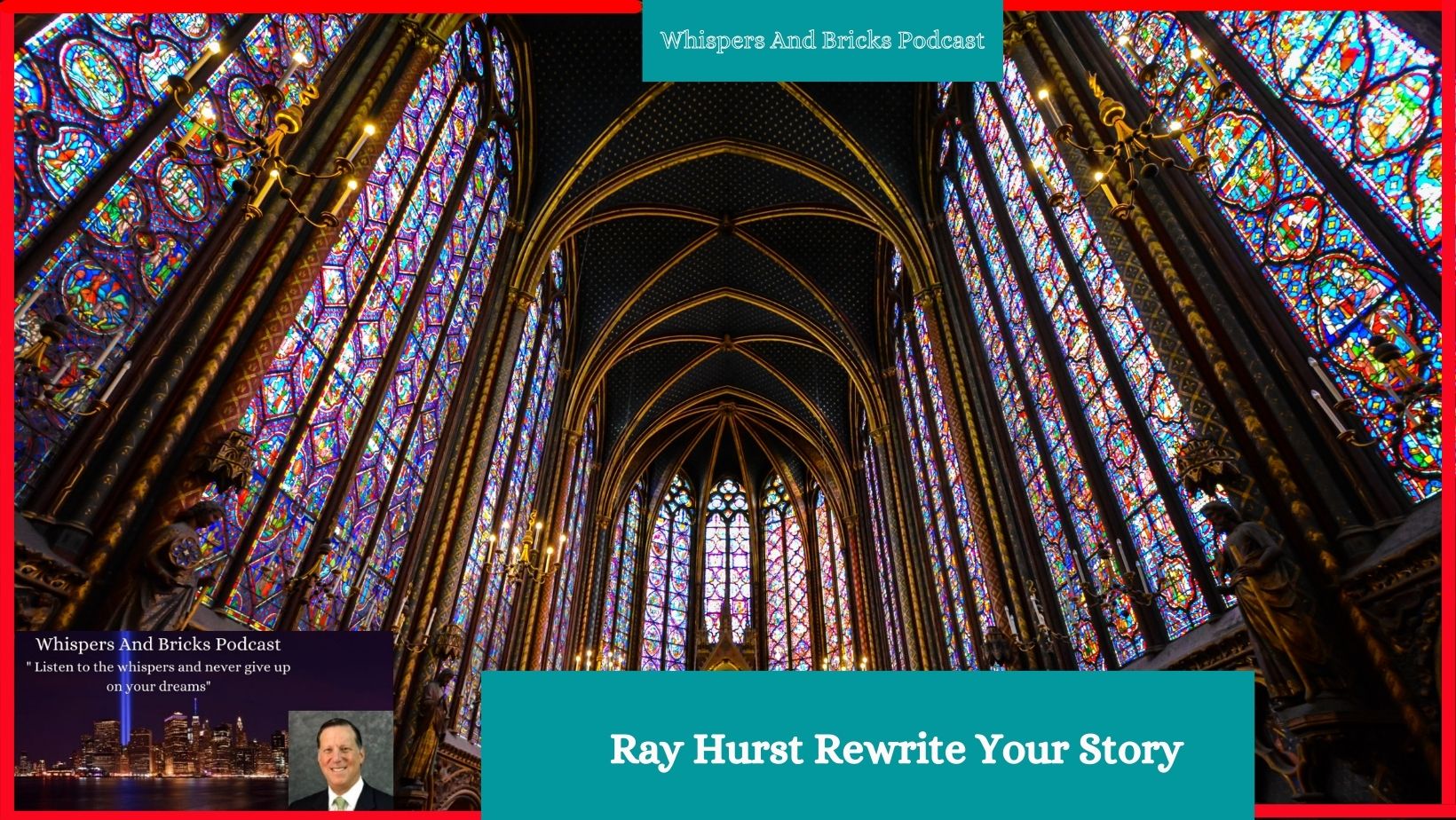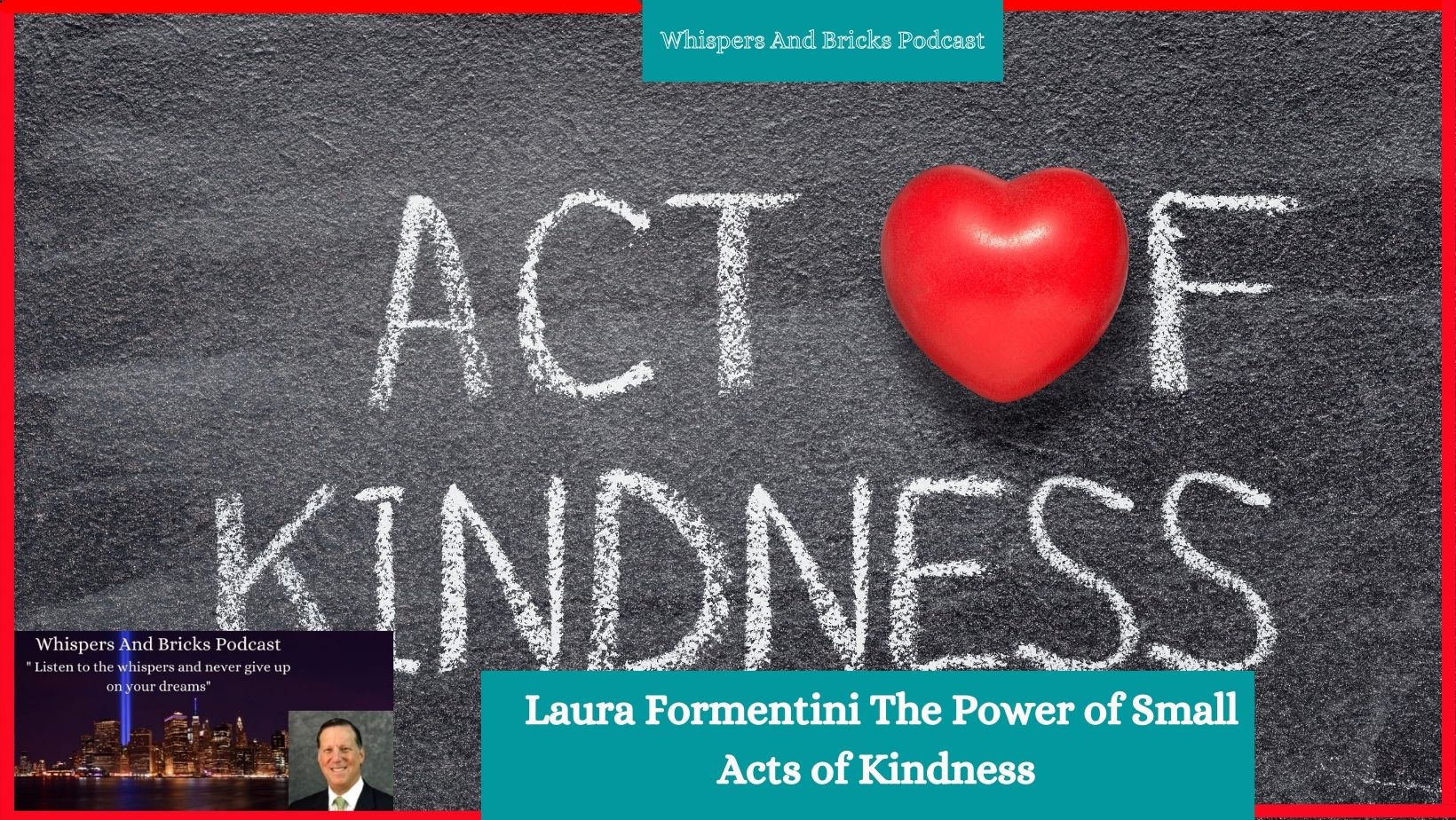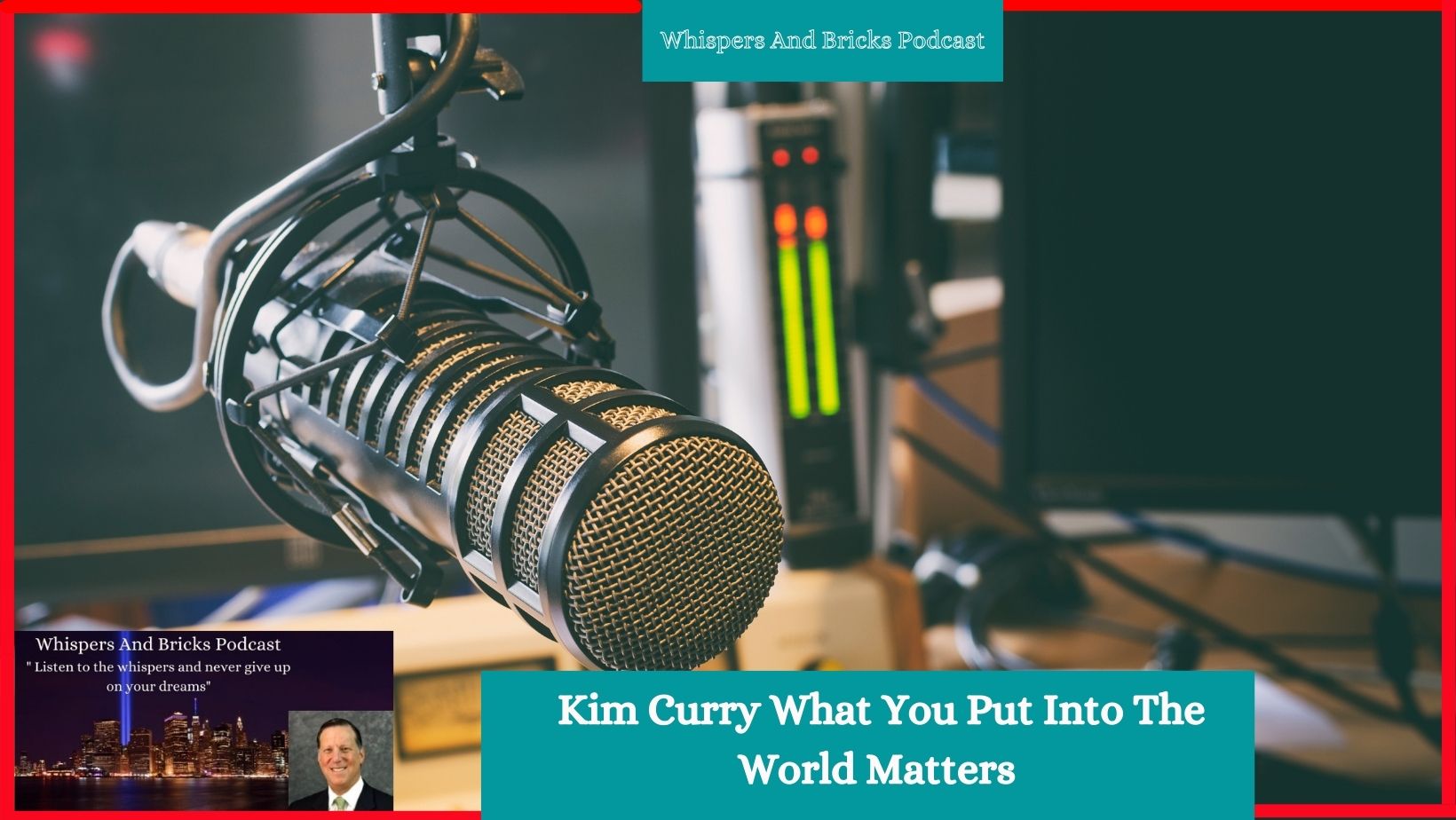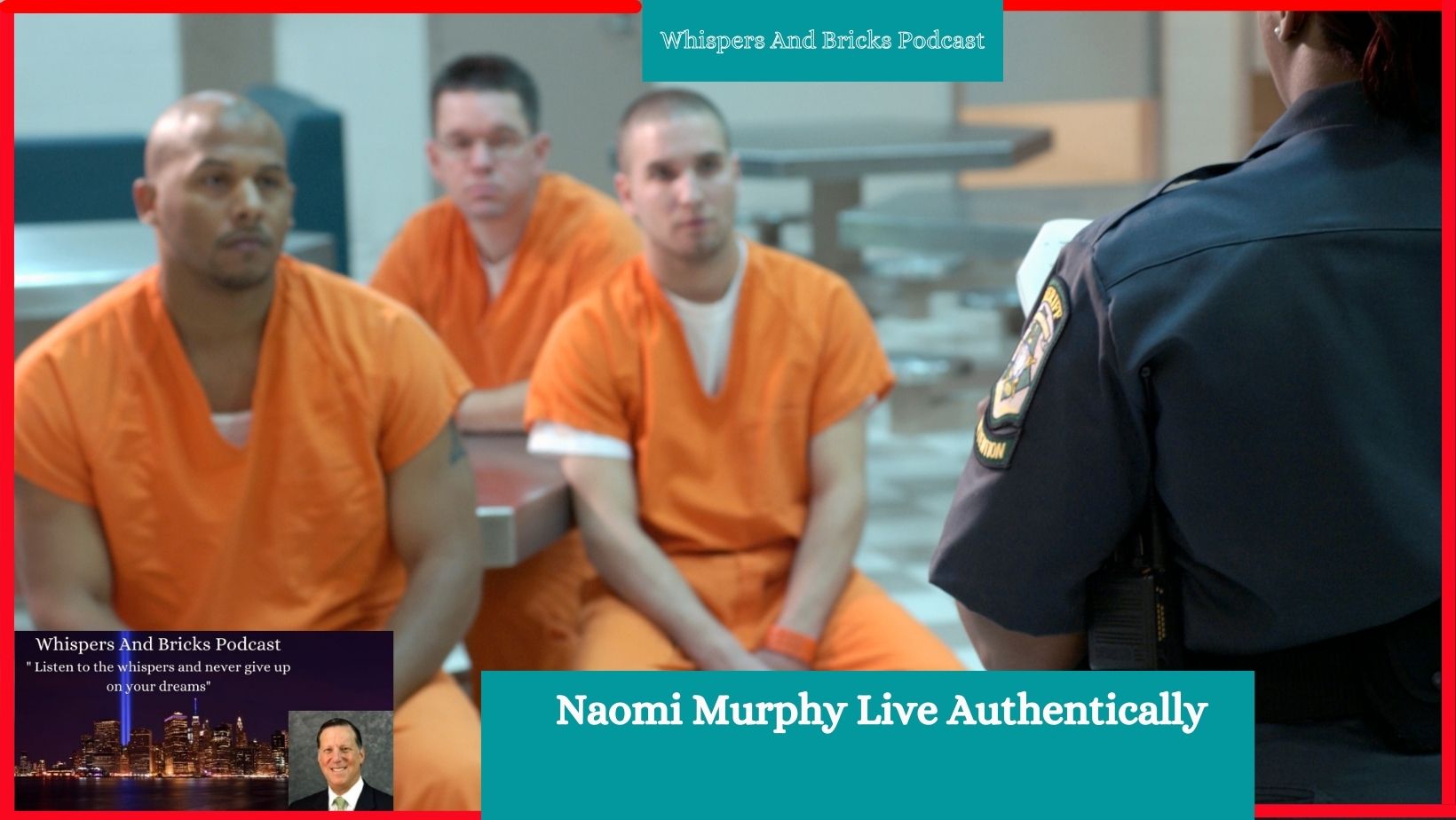Laura Formentini The Power of Small Acts of Kindness
Summary:
Laura Formentini has an amazingly inspiring story. Laura started her career as an anthropologist. After seeing how disproportionate the lives of the poor and the rich were. She wanted to capture the work that non-profits do to help people. It started as a passion and turned into a career. She was in Ethiopia when she was hit with a massive brick. She received the news that his son had committed suicide. She was devastated and alone. She talks about the whisper, the act of kindness that helped her get through and changed her life. She explains why she wrote 21 olives trees and how it can help you. She talks about the extraordinary work she is doing now. Best of all, she reminds us `how a small act of kindness can create a huge ripple of kindness.
Episode Transcription
Intro Plays
Ari: Welcome to whispers and bricks. My name is Ari Shonbrun. I’m your host. My guest today is Laura Forman teeny. She is an author, nonprofit photographer, and trauma recovery advocate, who has worked all over the world with countless NGOs and seemingly ordinary people who have accomplished the extraordinary for more than 15 years. Her world collapsed when while working on one of our books in Ethiopia, she received the news that our son had taken his own life on the other side of the planet in Denver, Colorado. A stranger helped her through the hardest day of her life by holding her hand all day until it was time for her to fly back to the US by herself, saying that he wasn’t doing anything special because it was his human responsibility. Laura has become a passionate advocate of how selfless human acts of kindness can help change the world. The strangers act of kindness prompted her to write her upcoming book 21 olive trees, a mother’s walk through the grief of suicide to hope and healing. That book received an endorsement from Deepak from Deepak Chopra. And she dedicated the book to her son, and all the empaths in the world, as she reminds others of the importance of holding each other’s head during hard times and asking the world to join her in this effort to retrieve our intrinsic humaneness. Please help me welcome Laura Forman Tini. Look, Laura, how are you?
Laura: Hi, Ari. I’m really well, thank you. Thanks for having me.
Ari: Oh, it’s my, my pleasure, my pleasure. How you been? What’s going on?
Laura: Yeah, everything great. I’ve been I’m launching the book 21 olive trees in two months. And so I’m in the midst of working with various bookstores and putting together my book tour, both in the US and in Europe for next year. So pretty easy.
Ari: Well, that’s great. That’s great. Thanks so much for coming on the show, as my guest. You know, as you know, the name of the podcast is whispers and bricks, and the whispers of those voices telling us what the right thing to do is, and they represent the good in life. And the bricks represent the bad things that we go through in life. And let’s be real, we all go through some, we all get hit with some sort of a brick at one point in time or another in our lives, some with more, some with less, some bigger, some smaller, but we all go through it. Now there isn’t the reason I asked you to be on the show is because after I read your story, I knew that there were people in my audience who go through the same things that you have gone through, they’ve been hit with bricks, much like what you have gone through, and they needed to hear and to know that they could get through the trials and tribulations, the same way that you did. They need to know that there are whispers out there that could save them. Now to start with, I’d like you to share with my audience, like what was life like growing up? And how did you decide on becoming a professional photographer.
Laura: So growing up, I grew up in Italy, and I left my country when I was about 20 years old. And I was very passionate about archaeology because I really wanted to travel. And I’ve always been very curious and interested in the culture in general, and just wanted to explore the world. And so that was an archaeologist for quite a quite a bit, until my travels really taught me how much disproportion there was between rich and poor in the world. And so I slowly left the archaeology to become a photographer and I became a photographer. First, it was kind of like a passion. And then it turned into a profession. And I decided to work with nonprofits and really capture their day to day life and see how, you know, really captured their grid to their perseverance and how no matter what, you know, a lot of people keep going and so I’ve worked with orphanages and communities and animal welfare organizations and, and so it it’s still I still was able to travel of course, but it was more of a travel with a purpose. So it’s kept us desire to travel all over the world, and I incorporated the purpose and so I was able to work with Wonderful people who’ve helped me to really realize that we are all the same in the end, doesn’t matter if you’re rich or poor. We all need the same things. And you know, love is always at the base. And it’s really the force that keeps us keeps us strong and can love is really something that can change the world in a big way. So, that’s, that’s what I’ve been through for the past 15 years.
Ari:Are you married?
Laura: I was I am in a relationship. Yeah.
Ari: Okay, but you weren’t okay. I don’t want to ask the hard hard questions. So I will, um,
Laura: oh, no, that’s fine. That’s fine.
Ari: I mean, when? Okay, I’m just Wow, I’ve never been stumped for words before. Okay. So I’m solo. Let me ask you this. So you were in Ethiopia? When you had this major brick thrown at you. Now? Were you married at that time?
Laura: I was not married. It wasn’t a relationship. And it’s, it’s still the same relationship.
Ari: Okay, so yeah. So, but you did, obviously, you did have a child.
Laura:
Yes, ain t was currently with his family in the States, working for the summer. And he’s, he was 21 at the time. So he was in Colorado at the time while I was in Ethiopia. And I thought things were going fine. Till I received the call. And, obviously, I had to drop everything that I was doing, and cut short my trip in Africa and frantically find a way to get back to the states on the same day. And
Ari: so how old were you at that point? If you don’t mind me asking. I’m sorry. How old? Were you at that point?
Laura: How old was I was 4747.
Ari: Okay, and you were traveling, you’re in Ethiopia, you’re by yourself? I’m assuming?
Laura: Well, I was by myself? Yes. Not really, I was by myself. I didn’t have anybody from the States with me, I had connected with a group of locals in Ethiopia, who were helping me to discover stories of transformation from other local people, how they made it through their lives and what their life was like previous before. Basically, I was just collecting stories of inspirational transformational stories. And and so what happened was I, I had to cut cut short my trip and find this flight. Right back to the States.
Ari: Right. Before before we go on to that. Okay. What I’d like to know is, and I’m sure most like to know, do you have any? You so you were on some sort of not a fact finding mission, so to speak, but more of interesting stories of, of a guess of kindness? Or, you know, the human emotion and the like, is there any story that sticks out in your mind from that period?
Laura: Sure. Well, I spoke with several mothers who had lost their children in childbirth, for instance, and they were discussing how how they had made it through thanks to their families, thanks to their friends and how it had impacted their lives severely, but also how they had come out of that situation by helping other mothers who are going through it. So that was something that happened. I had interviewed, especially one mother who had gone through this the day before I had received the call. So that helped me tremendously because she had so much grit and perseverance. And she was recounting her story to me and, and it was incredible to talk to this woman who seemed completely healed. After having lost, I believe three children in childbirth.
Oh, my God. Yes. Wow. Yeah. I was that just because of a lack of proper medical facilities or Yes,
and she actually lived in a rural area. And in the rural area, unfortunately, they don’t have enough. They don’t even have the proper surgical instruments. They don’t have enough beds, a lot of times the beds are just beat up mattresses and, you know, in the hospitals, I mean, and so it’s, there’s a complete a lot of times you’ll find complete lack of hygiene. And it’s, it’s very, and Ethiopia is one of the poorest countries in the world as well. So it’s very common, unfortunately.
Ari:Okay, so I guess we have the we have the setting here. All right, you’re in a very, very poor country, people, their life expectancy obviously isn’t great. You’re trying to do the best you can try to help as many people as you can gathering stories, taking photos, you know, trying to try to make the world a better place. And you’re doing everything you can. And then you get that phone call, tell us what that was like, please.
Laura: Well, that’s obviously a phone call that shattered my world completely. And what happened was I, again, I had to find a flight to go back and on the same day, and it was not easy, because I was in the rural Ethiopia at the time, okay. And so from the rural Ethiopia, I had to find a driver who take me to Addis Ababa, which is the capital. And then I couldn’t find anything that was just one connection, I had to actually go from Addis Ababa, to Dublin, Ireland, Dublin, Ireland to Boston, and then from Boston, all the way back to Denver, and you’re talking about 35 hour trip, it was insanely long, but it’s all I found for the same day. And so it’s, I booked it. So I was there with a group of people, Ethiopians who helped me to book my flight back, but nobody could fly back with me. Nobody had a passport. And so I took that flight by myself.
Ari: How, what year was this? This was
Laura: two in 2019. It was August 2019. Okay, so it was two years to almost two and a half years ago. And so, one that so my, my tour leader, the tour leader, she told me, Listen, nobody can be with you all day long until the flight departs. And nobody can come back with you to the States because nobody has a passport. But there’s a friend of mine who has volunteered to be with you all day, until your departure. And so this person was a complete stranger, his name’s us. sayfa is from Addis Ababa, and comes from a very poor family and his wife was very pregnant at the time. Any nontheless volunteer to be with me all day long. And so I met him and he met me as I was shivering and shaking under the note, how am I going to do this? How am I going to fly? You know, all the way back there by myself after having gone through this. And so he meets me, I’m shivering, he holds my hand right away. And he, he says to me, you’re okay, louder. You’re okay, sister. You’re going to be okay with me. And so he held my hand all day long. You’re talking about 10 hours. This is a stranger, complete stranger. And he kept checking in with me every every 10 minutes or so. And he kept asking, are you okay? And then Are you okay, sister. So it’s almost like we had a brotherhood a sisterhood right away. I didn’t know him. But it’s almost like I had known him forever. And he was the same for him. And so it’s, it’s incredible. He took me to lunch, he took me to an archaeological museum, knowing that I liked archaeology. That was my passion. And so how am I handle the long and he took me to the airport that evening. And when he was bored, I asked him, I said, Why do you do all of this from you don’t even know me. And all he said was, I didn’t do anything special, louder. It was my human responsibility. So those words, believe it, believe me, stayed with me. And his presence filled my soul. He he I was able to fly back thanks to his presence thanks to his kindness thanks to his words and it was it there is no way I would have ever been able to make it so he was that light that appeared out of the blue that what they call angels, I guess. He really appeared out of the blue and I feel that you know, he he didn’t think that he did anything special because he was his human responsibility but what he’s a small act of kindness really changed my world. It it helped me to start healing. And so I only seen him once but we’ve kept in contact and so we talk maybe once once a week on WhatsApp or and we’ve kept in contact with Kathy touch up told him that I would definitely help him With his business, and I will love to have him over in the States. And I’m actually preparing for a TEDx for next year, and I will love to invite him over and share the stage with him. My, my message is really how small acts of kindness can change the world because it doesn’t have to be anything grandiose, it can be just a small act of kindness, like what he did. But he never know the Maton the magnitude of your acts of kindness,
Ari: right. So basically, you get hit with this major, major brick, you got a phone call that your son took his own life. And then lo and behold, the whispers start to come in the form of this gentleman who starts helping you, and his kindness. And he’s, it’s, it’s just his whispers to, you know, to your mind into your heart. Okay, that actually helps you get through this whole tragedy, taking you to museums to I guess, to help take your mind off of the things not sure you could, but in some way, shape or form to help a little bit. And because of that, you turn around and you decide to take this tragedy and turn it into a positive. Right? So yes, tell us tell us a little bit about that.
Laura: Yeah, so he inspired me to keep going. And again, I only saw him one time. But he’s, he’s presence in he’s an extremely simple man. Very kind for very, very simple. He was, you know, he was he said, he wasn’t doing anything special. But it was just this deep, deep love that he that he was showing towards me that helped me to start healing. So when I went back, within, like about four or five weeks of being back, obviously, we had to go through the process of I don’t even want to talk about it. But you know, after having dealt with my son’s things, I I started writing notes to my son and poems to my son, and, you know, just to in a cathartic way, just to release the pain that I had inside. And then one day, I decided to write a poem, I mean, I’m sorry, a fable. Then another day, I start writing as parts of an introduction. So I had no idea that this would turn into a book, it was really a writing to heal sort of thing. I’m never been a fan of therapy, for instance, I, I’ve tried it a couple of times, but it never worked for me. So writing for me was extremely healing, because I was able to release all the stagnant emotions that I had inside. So I was able to let the emotion flow, okay. And so little by little, I started meeting people who came, who crossed my path. And who, who would say to me, you know, this returning to book, this can be really positive and healing, not just for you, but also for others who are going through the same thing. And so, so it turned out to be a book. And it took me about two years to finish it. So it’s a book of has an wonderful introduction. And it’s a 21 Fables because my son was 21, I decided on the title 21 olive trees, because the olive tree is a symbol of power of regeneration of strength. And, you know, a lot of the of wisdom, a lot of the qualities that my son had, my son was an empath, and I’m an empath as well, he never realized that empathy was his biggest gift. So he left before realizing that empathy can heal. And he always felt that the world was too harsh to live in for him. But so I decided to dedicate this book to, to him and all the indie empaths out there in the world, because I know what it means to be an impact. I am one. And so little by little, again, the right people showed up at the same at the right time, the right. Situations, materialized in a way where I was able to put a book together. And then I started sending out the book to various people, various authors, and I got this amazing endorsement from Deepak Chopra. Without it and so I believe that it’s a book that can be beneficial for anybody who’s going through some sort of personal loss, like really tragic, personal loss. It doesn’t have to be suicide. It can be divorce, it can be manmade or natural disasters. It can be anything that is really hit you really hard. But it’s, it’s my way of saying you can heal from this, you can always turn the negative into a positive. And I was able to do it thanks to an act of kindness and the act of kindness that I received from the Ethiopian street Granger I was able to turn it around and form an epic an act of kindness for the world. This is a gift that I’m gifting to the world. That’s my act of kindness that I have created out of what was given to me in Ethiopia. So it’s almost like a domino effect. It’s been incredibly healing for me to meet this man for just one day. And then I’m hoping that this book will hold as many hands as possible, just like I did with me.
Yeah. So it’s really amazing. I’m going to tell you. When my father died, it’s going on six years now. And he was living in Israel. I was living in the States, and I have a brother who was living in Israel. And he emailed me to tell me that my father passed away. He had been sick. But it was funny because I would I spoke to my brother on Thursday on a Thursday, and I said, Is daddy, okay, oh, do I need to come? And he said, no, they changed his medication. And he’s responding and he looks good. And everything is fine. I said, Okay. And then he passed away on Saturday. Right? And I went when I went to Israel. So what I what I was doing every night, I had my laptop with me every night, I would write about the, the events of the day what was going on. And I found it to be very, very therapeutic. And I was doing it wasn’t for it wasn’t for publication. It wasn’t for, you know, it was just, it was just my feelings. Yeah, things that I was thinking about. And I actually I forgot if I put it out on like, on Facebook, or something I don’t remember. But I do remember people telling me oh, you know, what your writing gave me such inspiration. And it was a planner. And that Yeah, that’s so I kind of know where you’re coming from? Yeah, yeah.
Ari: Okay. Obviously, you know, mine is more of a natural order of things. Yours was not. But again, you know, it’s I, I hear where you’re coming from, and and it’s wonderful, you know, the things that you’re doing. So, what, so like, what are you up to now you’re writing a book? Are you still doing your photography? Are you still working with the nonprofits? What what’s going on?
Laura: Yeah, I’m doing it all. I’m, obviously well, I have a lot of projects that have been have, you have been moving kind of slow because of COVID. But one of the big projects that I have is with Plan International, which is an organization that helps people sponsor children, and as well as they also advocate for girls rights. So I’ve been sponsoring probably more than 50 children over the past 17 years with them. And I am currently partnering up with them to write a book on the positive impact of child sponsorship. So I was supposed to go last year to Nepal, Bangladesh and India to interview the adults who had been sponsored as children to really cover their, their path. before, during and after sponsorship, so how what kind of positive impact sponsorship has had on their lives. We are reengaging with the current with these countries towards the end of this year, beginning of next year. So I’ll be traveling, hopefully when when the when this country’s reopened, but we can start the interviews virtually. I’m also working on a few projects in Puerto Rico, where I’ve been nonprofit photographer for three different animal welfare organizations. And yeah, and then I still, I’m putting together a campaign, free campaign of sterilization for many stray dogs in South Sicily, where I’ve already I’ve already done a bunch of campaigns down there. There’s trade offs everywhere. So there’s a lot a lot of opportunities to to be an activist. I’ve learned how to fundraise and fundraise for a lot of different organizations and it’s just my passion is to, to to help out into I really realized that we’re all in the same boat and you know if we are able to, to give some of, you know, some of our resources Yeah, Be it you know, anything, you know, just this do it. We’re all in this together. And so it’s my passion to to make the world a better place or at least to try to
the one question,
Ari: I think the one with the one question I didn’t ask which I should have asked the beginning what was your son’s name?
Laura: So his name was blase. blase, blase BL A is he? Yeah. And he, we him and I were soulmates, we still are I feel his presence, I feel his energy. And we live together on two different countries in the States and Europe. And, and it was just, he was just like an incredibly sweet, generous, ultra sensitive person. We weren’t, we had planned to work together in the nonprofit field. In fact, he was, he wanted to go into documentary films. And so we were very, very, very close. And I feel that it’s almost like I felt his presence as I was writing this book. And it was very healing, because a lot of times, I would wake up the following day after writing without the following day, and I read what I had just written, and I couldn’t believe I didn’t really write all this, it’s, it was so beautiful. And so I feel that we are still working together. And it’s, it’s, it’s just wonderful. I don’t feel I feel that I have healed. I do there are days where it can be tough enough to have him here physically, but I know that it’s for the greater cause. And if they can, if this book can help people, to to heal, to get better to see things from a different perspective. So it’s I believe that that will be that will be worth the pain that I went through.
Ari: Are you still are you still in Colorado?
Laura: No, I I’m actually in California.
Ari: Okay, yeah. All right. Well, um, you know, I know that Blaze is looking down on you. And he’s very proud of his mom. You know, it was, I guess, you know, God takes the people that he wants to, in some way, shape or form when he wants to. And I think that, you know, it was, I think God was looking at Blaze and saying, I need you here. And, and blaze said, You know what, I’m coming. And you know, and that’s what happened. But again, you know, your, what the work that you’re doing is is a tribute to his memory. I think people are going to realize what kind of a boy he really really was, through your writings and through your books, etc. So, I think it’s wonderful. Is there anything else that you’d like to share with my audience? Before we go words of advice or words of wisdom?
Laura: Um, you Yeah. Okay. So I, I would say, one of the main messages of this book is that love, love does not die. Okay. So the physical form might go, but this, the spirit does not die, the which is, you know, pure love, love does not die. And so, I wanted to share this quote by Booker Washington. He was an advisor to many US presidents in the late 1800s, early 1900s. He said, one of his quotes was, if you want to lift yourself up, lift up someone else. And I believe that, you know, as our new year’s resolutions are approaching, you know, January scummy, you know, I believe that it’s important to maybe realize that we can practice these small acts of kindness every day. Now, knowing the magnitude of these acts of kindness, so you never know, where these small acts of kindness can go, the domino effects that they can have, they may not mean much to you, but they can mean the world to someone else. So maybe as a New Year’s resolution, what we could do is remember this quote by by Booker Washington, if you want to lift yourself up, lift up someone else. And it doesn’t have to be anything grandiose. You can start here right now from our homes, you know, anything that really is related to kindness, being kind of small acts of kindness can really change the world like it did with me.
Ari: Absolutely. Now if people want to get a hold of you, how can they do that? You have an email you have a website you have you know, how can they touch base with you?
Laura: Sure. My so my, my website is that Laura forming teeny that calm la ura fo r and e n t i.com I’m also on Instagram author Laura firming teeny. I’m also Facebook at author Laura for me teeny. And yeah, and I am starting my book tour in January book will be out January 11. It will be available on Amazon but also it’s going to be distributed to educational institutions like universities and libraries. It will be available at bookstores. So, you know, it’ll be pretty much everywhere in all formats, including audio book.
Ari: That’s awesome. Laura, I want to thank you so much for sharing your story with my audience. I’m sure you’ve touched the hearts of many in my audience. Good luck going forward. Keep up the good work. You know, I mean, you have what to be proud of. You been listening to whispers and bricks, and I’m your host, Avi. showman until next time, listen to the whispers avoid the bricks and never ever give up on your dreams. Bye for now.
